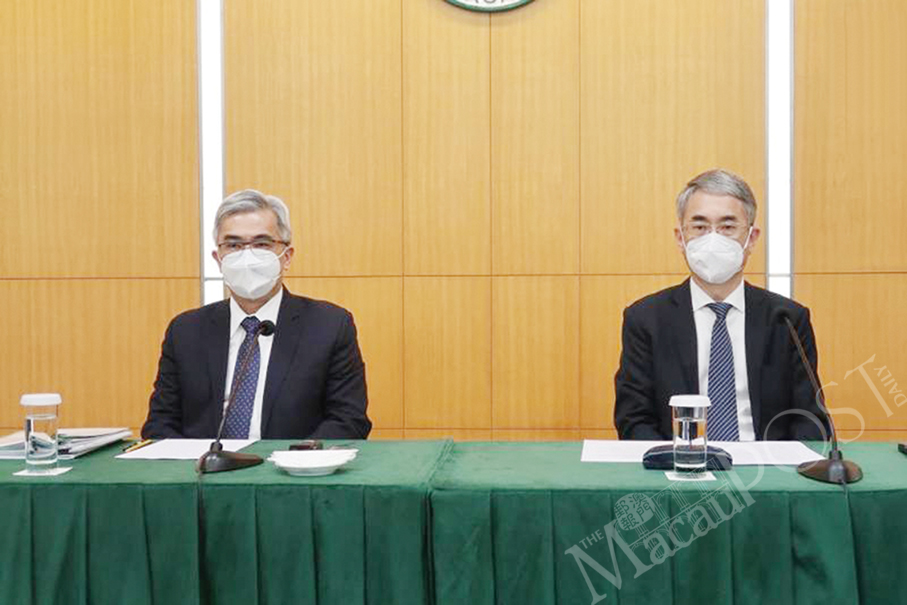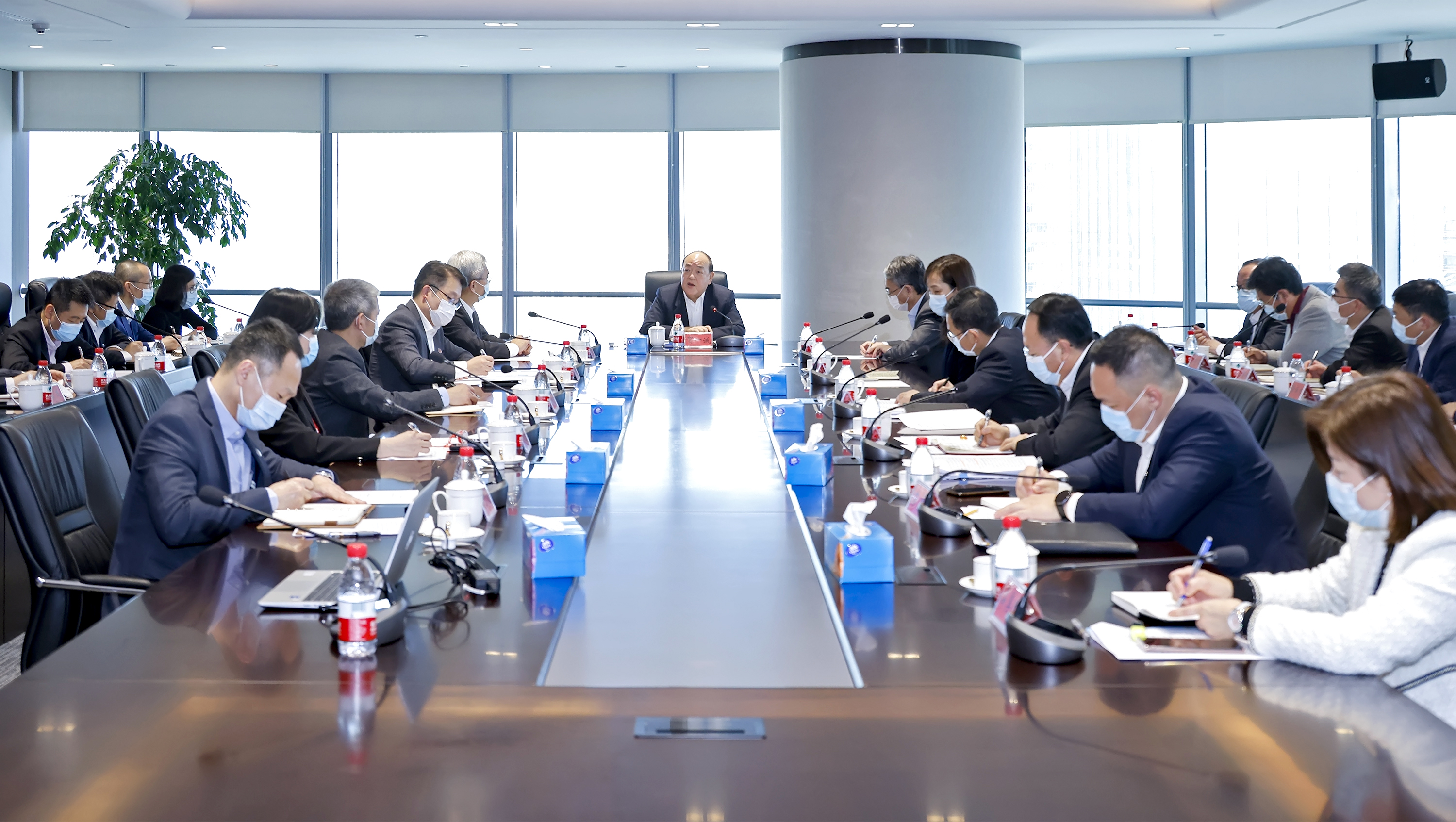The Macau government has finished drafting its national security law’s amendment bill, which aims to strengthen its ability to prevent external forces from interfering in local affairs.
The bill also aims to address shortcomings and close loopholes in the current version of the national security law, thereby ensuring that the Macau Special Administrative Region’s (MSAR) legal system on the protection of national security will be as capable of safeguarding national security as the respective pieces of legislation in the Chinese mainland and the Hong Kong Special Administrative Region (HKSAR).
Secretary for Administration and Justice André Cheong Weng Chon and Secretary for Security Wong Sio Chak co-hosted a press conference about the matter at Government Headquarters on Friday.
Cheong is also the spokesman for the government’s Executive Council. He and Wong announced the amendment bill on Friday after the council, the government’s top advisory body, which is chaired by Chief Executive Ho Iat Seng, had completed its discussion of the bill’s final draft.
The two policy secretaries said that the bill will soon be submitted to the Legislative Assembly (AL) for debate, review and vote.
After the passage of its outline by lawmakers, the amendment bill will be reviewed by one of the legislature’s standing committees before it is resubmitted to another plenary session for its second and final debate and vote, after which the government will promulgate the amendment bill in the Official Gazette (BO) in due course.
According to Cheong and Wong, the amendment bill will take effect on the day after its promulgation in the Official Gazette.
‘Increasingly complex national security landscape’
Cheong said that Macau’s national security law needs to be improved with the aim of enabling the local government to tackle the increasingly complex landscape affecting national security, to continuously fulfil its constitutional responsibility required by Article 23 of the Macau Basic Law, to better safeguard the nation’s sovereignty, security and development interests, and to comply with the central government’s holistic approach to national security.
The central government’s holistic approach to national security put forward by President Xi Jinping lists various non-traditional threats to national security that the country is facing, in addition to the traditional ones.
Consequently, Cheong pointed out, the Macau government carried out a public consultation between August 22 and October 5 this year on the draft of its national security law’s amendment bill. Afterwards, the government published a report on November 7 summarising the opinions and suggestions gathered during the public consultation process, Cheong noted, underlining that the local government has drafted the amendment bill after fully studying the opinions and suggestions submitted during the consultation process.
According to Cheong and Wong, the bill proposes to upgrade Macau’s national security law to a complete and comprehensive piece of legislation on safeguarding national security, a change from the current version which is merely a penal law that punishes offences endangering national security.
Cheong said that the local government expects the improved version of the local national security law to become the “fundamental and core” law of Macau’s legal system on the protection of national security. The improved law will be able to better prevent crimes endangering national security while protecting human rights, Cheong said, adding that the local government aims for the amended version of the law to more effectively prevent external forces from interfering in the affairs of the MSAR.
Macau enacts national security law back in 2009
Macau enacted its national security law – the Law on Safeguarding National Security – back in 2009, based on the Article 23 requirement of the Macau Basic Law.
Macau’s national security law, Law 2/2009, hasn’t been amended since its enactment in early 2009, because of which the bill announced on Friday will propose the first amendments to the Law on Safeguarding National Security, which took effect on March 3, 2009.
Macau’s police forces reportedly have never enforced the local national security law, i.e., no one has faced charges concerning criminal offences listed in the law.
Article 23 of the Macau Basic Law states that the MSAR shall enact laws, on its own, to prohibit any act of treason, secession, sedition, subversion against the Central People’s Government, or theft of state secrets, to prohibit foreign political organisations or bodies from conducting political activities in the MSAR, and to prohibit political organisations or bodies in the MSAR from establishing ties with foreign political organisations or bodies.
The current version of the local national security law lists the five crimes endangering national security stated by Article 23 of the Macau Basic Law and their respective penalties, namely treason, secession, sedition, subversion against the Central People’s Government, and theft of state secrets.
‘Improving’ response to existing crimes, adding new crime of instigating sedition
According to Cheong and Wong, the amendment bill proposes to extend the scope of certain existing criminal offences listed in the local national security law, as well as to add a new criminal offence to the law.
Cheong said that the bill proposes to “improve” the scope and definition of the crime of secession, as defined by Article 2 of the current version of Law 2/2009, and the crime of sedition, as enshrined in Article 4 of the law’s current version.
The bill, according to Cheong, also proposes that subversion against the Central People’s Government, as defined by Article 3 of the current local national security law, should be extended to subversion against the political power ruling the nation.
In addition, Cheong said, the amendment bill proposes to add the new crime of instigating or supporting sedition.
Moreover, the amendment bill also proposes to change the name of the crime of “theft of state secrets”, as defined by Article 5 of the current version of Law 2/2009, to “violation of state secrets”, Cheong said.
Bill proposes to cover any type of organisations ‘outside’ MSAR
In compliance with the Article 23 requirement of the Macau Basic Law, the current version of Law 2/2009 also lists additional punishments concerning foreign political organisations or bodies that commit the five crimes endangering national security (namely treason, secession, sedition, subversion against the Central People’s Government, or theft of state secrets) in the MSAR, and additional punishments regarding Macau-based political organisations or bodies that establish ties with their foreign counterparts for committing the five crimes.
According to Cheong, the amendment bill proposes that such additional punishments should be extended to any type of organisations, i.e., not only political ones, and should also be extended to organisations “outside” the MSAR, i.e., not only foreign ones.
However, during Friday’s press conference Cheong did not elaborate on the government’s proposed amendments to the crime of secession and the crime of sedition, neither did he lay out details concerning the proposed new crime of instigating or supporting sedition.
The government’s public consultation document released in August laid out certain details concerning proposed amendments to the crime of secession and the crime of sedition, as well as the proposed new crime of instigating or supporting sedition
Bill ‘basically the same’ as consultation document: Wong
Wong said during Friday’s press conference that the amendments proposed by the bill are “basically the same” as the content laid out by the public consultation document, with only “minor changes” to the wording.
According to the consultation document released in August, the local government proposes that secession by non-violent means should also be punishable.
According to the current version of the local national security law, the crime of secession, as defined by Article 2, covers those who use violence or other grave illegal means in an attempt to separate Chinese territory from the nation or subject it to the sovereignty of another state.
The consultation document also elaborated on the local government’s rationale for its proposal for the crime of subversion referring to “the political power ruling the nation”.
Article 3 of the current local national security law, concerning the crime of subversion against the Central People’s Government, covers those who use violence or other grave illegal means in an attempt to overthrow the Central People’s Government, or to prevent or hinder it from exercising its functions.
The consultation document noted that the current version of Article 3 does not cover acts against the fundamental system of the state and acts against other organs of the central authorities.
In addition, according to the consultation document, the local government also proposes that subversion by non-violent illegal means should also be punishable.
Wong noted on Friday that the bill does contain the non-violent illegal means laid out by the public consultation document.
Moreover, according to the consultation document, the government proposes to widen the definition of the crime of sedition as enshrined in Article 4 of the current version of the local national security law.
The current version of Article 4 covers those who publicly and directly incite others to commit treason, secession, or subversion against the Central People’s Government. The article also includes those who publicly and directly incite members of the People’s Liberation Army (PLA) Macau Garrison to abandon their duties or to rebel.
According to the consultation document, the local government proposes to also punish those who publicly and directly incite others to participate in riots endangering national stability, in addition to the current scope of Article 4.

Secretary for Administration and Justice André Cheong Weng Chon (right) and Secretary for Security Wong Sio Chak address Friday’s Executive Council press conference at Government Headquarters about the local government’s national security law amendment bill. – Photo courtesy of TDM









